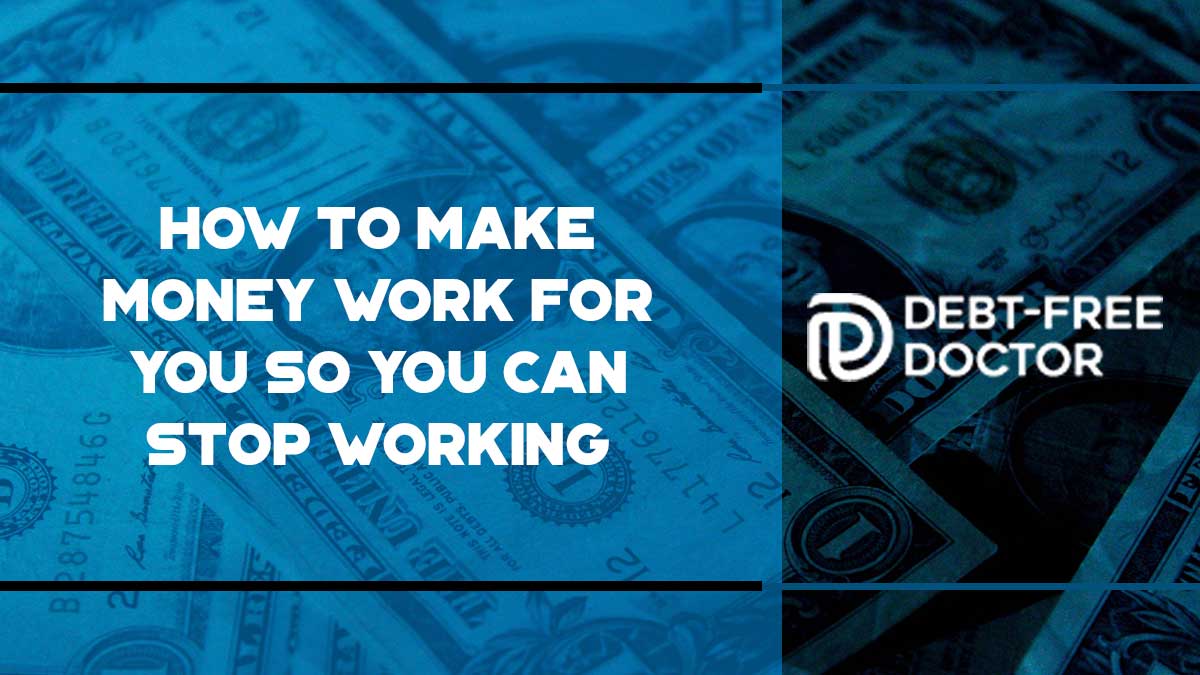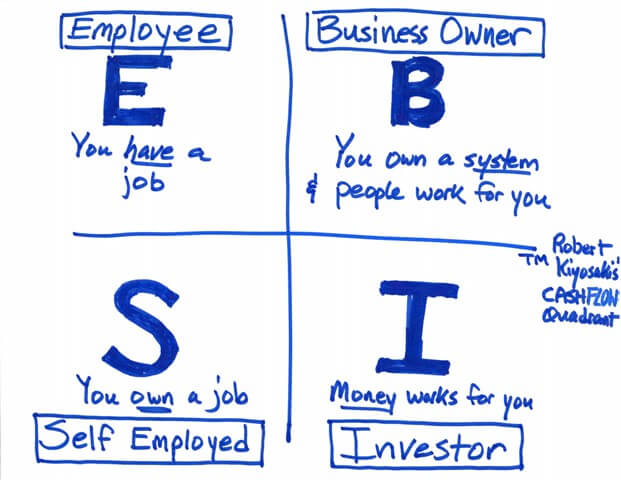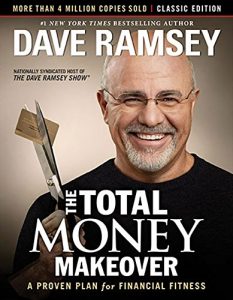Growing up, I’d frequently hear successful people say, “If you want to get rich, you have to make your money work for YOU.”
When I first heard this advice in high school, I didn’t have a clue what it meant.
“The rich don’t work for money. They make their money work for them.” – Robert Kiyosaki, author of Rich Dad Poor Dad
Just last night my wife and I were eating at our favorite restaurant in our home town of Monroe, LA. The 23-year old maitre’d, who I frequently talk to about real estate investments, told us that he’s 100% committed to achieving one goal – getting filthy rich by the age of 40.
He used another word instead of “filthy” but you get the point. He asked what I thought were the best ways to achieve this goal.
I instinctively gave him the advice I’d heard growing up: “If you want to get rich, you have to make your money work for YOU.”
His immediate reaction was, “How do I do that?”
That’s the million dollar question.
Think about it. When you were growing up, where did you get financial advice from?
Was if from your parents, teachers or friend’s parents? if so, then you saw them working full-time jobs to earn money, right?
You probably overheard their conversations regarding financial stress or about how they worried about losing their jobs.
Also, your parents may have told you at some point they “couldn’t afford to go on vacation or buy whatever it was you wanted them to buy.”
So if you continue to work similar to how your parents and friends have relying on one income source and that source goes away, imagine the amount of stress that would put on you.
Trading time for money will NEVER make you wealthy. Honestly when I think about it, it’s an unhealthy way to live too.
Most people work until they’re 65 or older investing in the stock market in a retirement account worrying of having “enough” during retirement. This is how I started off when I opened my own business until learning about working SMARTER and not what society tells us, to work HARDER.
The first time I received good news that a distribution check hit my account from a real estate syndication made me realize that my money was finally working for me. This was like receiving free money!
Are you ready to learn how to put your money to work too?
Read on….
Don’t Miss Any Updates. Each week I’ll send you advice on how to reach financial independence with passive income from real estate.
Sign up for my newsletterYour Time Is Limited
As a doctor, I understand that my earned income is limited by time.
This type of income is most familiar to us as it’s what we make when we’re trading time to earn a paycheck. Unlike unearned income (passive income), earned income is the highest taxed of the two.
Unfortunately for most people, they rely on earned income which causes them to pay the most in income taxes.
If this sounds familiar, then this puts you on the left side of Kiyosaki’s CashFlow Quadrant as either:
- an employee (you have a job) or
- self-employed (you own a job)
If you continue this cycle then your income will always be limited as:
No work = No income
Do you want to keep running on the time treadmill exchanging hours for money? I don’t think so.
What Does It Mean To Make Your Money Work For You?
After my training, the job offer I had secured fell through forcing me to start up a practice from zero knowledge. In dental school, we don’t receive financial or business education. This makes it hard to make intelligent investment decisions when first starting out.
Once we’re ready to start investing, the average person will use a financial planner to help develop financial goals for the future. Usually a financial advisor will prescribe active mutual funds as they get a larger commission instead of recommending index funds.
Next, we’re told that we should get ready to invest for the “long haul” (with them of course). Once we receive this advice we either follow it and work for 40+ years or learn how to use our money to work for us.
One of my first experiences of having my money work for me was ironically at a casino. When I was in college, I frequently hunted with a friend near the Mississippi river that enjoyed visiting the Vicksburg, MS casinos.
One night I had $5 left and decided to play the roulette table. I didn’t know much about it and instead of betting on a specific number with a higher risk, I bet that a red number would show up.
In this situation, I was attempting to use the $5 to make extra money. After the first wheel spun, that $5 made another $5 with zero work from yours truly. I actually let the same bet “ride” on the red space for 6 more spins and a broke college student walked away with over $600. I was on cloud nine!
I’m NOT recommending gambling as an investment strategy but the concept is the same. You’re using money in an attempt to get more money. The theory is simple but using it in the real world could get complicated.
I’m all about dumbing things down to make them as simple as possible to understand.
To me, making your money work for you comes from creating passive income. Easy enough, right.
You have downloaded my Free Passive Income Guide, right?
But there’s other steps that you must accomplish first before pursuing this type of income such as taking control of your finances. Look, you’ll never gain financial freedom until you have an understanding of where your money is going and how to find the best return possible.
3 Steps To Take Before Getting Started
#1 Create a budget
As someone that initially followed Dave Ramsey’s 7 baby steps, I found out how important creating a budget can be.
It’s hard to achieve financial stability when you’re in the dark about your inflow and outflow of cash.
But developing a budget is the first step to begin taking control of your finances.
In a nutshell, a budget shows you if you are spending more or less than you can afford. It also helps you direct your money to where it matters most, so you can stay on top of bills, pay down debt and start saving money to meet your future specific goals.
If you need help, there’s multiple free planning tools online.
#2 Start an emergency fund
Step #1 in Dave Ramsey’s baby steps is starting an emergency fund. No matter how careful you are, there WILL be times where you’ll need to come up with cash.
From an A/C unit going out or a hot water heater busting, having an easy way to access quick cash is a necessity.
Consider setting this up in a money market or a high-yield savings account. You’re going to want something that is liquid as you never know when the next emergency will come knocking.
#3 Connect with someone that’s financially successful
Looking back, this is a step I wish I’d taken much earlier than I did.
You don’t have to try to reinvent the wheel. No matter what your financial situation looks like, find successful people and pick their brain.
I’ve found that these people are more than willing to help as they realize they’ve reached success due to others helping them as well.
How To Make Your Money Work For You
There’s several articles online that give advice about how to accomplish getting your money to work for you.
Most mention ways such as:
- taking advantage of reward credit cards
- investing in annuities
- acquiring whole life insurance policies
- invest in cryptocurrencies
- becoming a gold investor
- opening a money market account or CD (really?)
- investing in the stock market using stocks, bonds, mutual funds, exchange traded funds (ETFs), a target-date funds, etc.
Yes, these are ways to accomplish this but most require you to continue working an extended period of time in order to reach financial freedom.
I want to focus on strategies to rapidly getting your money working for you in order to reach FI MUCH quicker than you ever imagined possible.
#1 Pay yourself FIRST
Think about how your work/finances are set up.
You work hard all week yet pay someone else first.
If you really want to get your money to start working as your personal employee, then paying yourself first must become a lifelong habit.
This is the first of 7 lessons in the book, The Richest Man in Babylon.
The IRS REALLY gets this concept as they pay themselves first with your money during each pay period. Speaking of the IRS, are you doing everything you can to lower your taxes?
The wealthy also get this lesson and pay themselves first whereas the poor don’t.
In order to make this process seamless, automate it to stay on track with your goal to make your money work for you.
#2 Become a silent partner in other businesses
Do you remember the Cashflow Quadrant discussed earlier? Becoming a Business Owner was one of two ways to get on the “rich” or right side of the quadrant.
This is an example of an active approach to investing. For our purposes today, I’m focusing on how you can passively accomplish getting your money working for you.
Another way to make your money work for you would be to invest in someone else’s business venture.
Depending on its success, a silent partner can sit back and watch their money grow.
#3 Generate passive income with real estate
If you’re serious about reaching financial independence (FI) within 5-7 years, adding real estate to your investment portfolio is a must. One of the ways you can become a passive investor is by investing in a REIT.
a. REIT
When investing in a REIT, or real estate investment trust, you’re buying stock in a company that invests in commercial real estate. They can either be private or public.
The company will use your capital to invest in new properties such as:
- hotels
- self storage
- retail centers
- office buildings
- apartments
Investors can purchase these shares via the stock market through the purchase of individual company stock, mutual funds or exchange traded funds (ETF).
b. Real Estate Syndication
A real estate syndication is a group investment where funds are pooled together with other investors to purchase a property that’s more expensive than any of them could have afforded on their own.
So instead of buying several smaller commercial properties individually, the group of people can come together and buy a larger asset.
There are two basic roles in real estate syndication deals:
- Sponsor (Operator, General Partner or GP)
- Real Estate Investors
Sponsor
The sponsor plays the most critical role in the syndication investment.
This group is the one that:
- Find the investment property
- Obtain financing
- Acquire the investment property
- Manage the property
Investors
Investors are also known as Limited Partners (LPs). These are the passive investors (you and me) who invest into deals.
They have no active responsibilities in managing the asset. (My favorite part)
Why I Like Real Estate (5 Reasons)
There are 5 ways that real estate makes your money work for you which is why I love investing in it.
5 Ways Real Estate Makes Your Money Work For You
If you’ve invested in real estate in the past, then you know that each dollar you invest in each project works for you in more ways than one.
Here are the five ways:
- Cash flow
- Leverage
- Equity
- Appreciation
- Tax benefits
#1 Cash Flow
This is perhaps the biggest benefit of investing in real estate. Unlike other types of investments, real estate generates passive cash flow.
It’s simply what’s left over from the money coming in via rent tenants pay each month minus expenses.
- Positive cash flow = a surplus
- Negative cash flow = a deficit
If you’re invested in an apartment complex that collects $10,000 a month and expenses are $8,000, then your cash flow is $2,000 each month.
This is what they call mailbox money.
#2 Leverage
If you’re a home owner, then you’re familiar of what it means to use leverage in real estate.
It was leverage that allowed you to borrow money to help finance a home in the form of a mortgage.
Most millionaires have real estate in their portfolio as they know what a major advantage financial leverage can be.
Leverage in real estate means buying property with debt instead of paying cash.
This allows you to buy a much larger asset and increase the potential return on your investment than you could if you had to pay 100% of the purchase price upfront.
For example, if you bought a $100,000 single family home, typically you’re not paying for it in cash. Instead, you’re paying $25,000 for the down payment, and your lender (the bank) brings the other $75,000 to the table.
The cash flow made is based on the full $100,000 and NOT the $25,000 portion.
Even though the bank put the majority of money into the deal, the entire rent check collected from your tenant goes directly to you, not the bank.
This is the power of leverage.
#3 Equity
Each month as rent is collected, it’s used to pay down the mortgage thereby increasing equity in the property. The rental property generates income to pay for itself without having to come from your own personal income.
This means that your tenants are essentially building that equity for you.
#4 Appreciation
When investing in real estate, your money also goes to work for you in the form of appreciation. If you’re a home owner and have sold a home owned for several years then more than likely you received more than you paid for it.
That’s appreciation in a nutshell. It’s the concept of a home’s value increasing over time.
The overall value of homes typically increase at a rate at least in line with inflation (around 3-4%).
Although appreciation is always nice to receive, it’s NEVER a guarantee. This is one of the reasons we personally invest for cash flow.
#5 Tax Benefits
The IRS gives out most tax breaks to those that purchase real estate and start businesses.
Regarding real estate, common deductible expenses are:
- renovations
- property management expenses
- insurance premiums
- property tax
Over time, wear and tear lowers the value of rental property and its contents. This process is tax deductible and is known as depreciation.
The deduction can be taken for the expected life of the property, but it must be spread out over multiple years.
Engineers can provide a cost segregation study to help identify and reclassify personal property assets to shorten the depreciation time for taxation purposes, which reduces income tax obligations.
You can also take advantage of a 1031 exchange which may allow you to defer taxes from any sale indefinitely.
The Bottom Line
While there’s multiple ways on getting your money to begin to work for you, there’s also steps to take FIRST before you start the process.
Getting out from under consumer debt (including student loans) and getting in the habit of paying yourself first can greatly speed up the process.
Once you’re ready to start, consider further educating yourself about real estate due to the multiple benefits it provides.
Join the Passive Investors Circle






